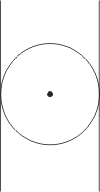Get Today in Masonic History into your Inbox. Sign up today for one of our email lists!
Need an article for your Trestleboard/Newsletter see our Use Policy
Point within the Circle

Today in Masonic History we present a Point within the Circle.
The point within a circle is a common symbol used in Freemasonry.
As with many masonic symbols the origin of the point in the circle is unknown. In carvings from Ancient Eqypt the Alpha and Omega symbols representing God often had a circle with a point in between them. In the case of the Egyptian symbol the two veritcal lines are replaced with snakes.
Regardless of the symbols origin, Freemasonry has adopted it to represent what is, in the opinion of this writer, one of our most important ideas in Freemasonry. In all interpretations of this image, the point in the center represents the individual man or mason.
Taking just the circle it is a reminder we are all circumscribed with a circle in our lives and those who enter the circle, both in a literal (people we see) and figurative sense (people who our actions may impact), have a claim on our kind offices. Our good will to our fellow man and our fellow mason is paramount to the moral ideals behind Freemasonry. It can also be said the same circle is a dividing line between our internal passions and a mason's duty to God and his fellow man. A mason should never allow his internal passions, prejudices and selfish interests to pass outside the circle.
There are many other references to the circle with the point in its center, there are also just as many interpretations of it's meaning throughout history and in the masonic fraternity. As an example some say it is in reference to the candidate circumabulating the masonic altar.
The two lines on either side of the circle, for Freemasons, represents St. John the Baptist on the left and St. John the Evangelist the right. Two prominent Saints revered in Freemasonry because of their connection with what is deemed the Mother lodge in Jerusalem. St. John Lodge of Jerusalem was first believed to be dedicated to St. John the Baptist and then to St. John the Evangelist. The Feast of St. John the Baptist falls on the Summer Solstice, the Feast of St. John the Evangelist falls on the Winter Solstice so the lines are also often said to represent the Summer and Winter Solstice.
Regardless of it's origin or interpretation the symbol is a reminder to Freemasons everywhere to remain true to our obligations to those around us and to ourselves.
This article provided by Brother Eric C. Steele.

